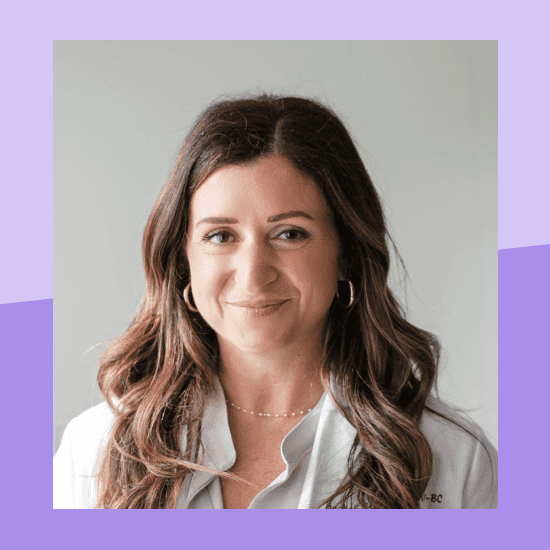
Published on Nov 08, 2022
Last modified on Nov 15, 2022
How Being A Women’s Health Provider Helped Me Navigate A Difficult Genetic Decision
6 min read

Whenever I introduce myself, one of the first things I mention is just how grateful I am to be doing the work I do. I am a board-certified family nurse practitioner and practice exclusively in the fields of menopause and women’s sexual health. In 2020, my passion led me to receive my national certification in menopause from the North American Menopause Society and become a part of the founding clinical team here at Elektra Health, an innovative women’s health company on a mission to smash the menopause taboo.
Throughout my experience caring for women in menopause, I have heard countless stories of medical gaslighting, and many patients show up to my office feeling despondent and devalued. While I was not yet in perimenopause, I promised to approach my patients with empathy and attentiveness and provide them with up-to-date clinical evidence in order to create a space of shared decision-making. I vowed to find a way to do better by my patients.
And then things took a different turn. I became a patient myself.
My journey began one year ago when my father was diagnosed with prostate cancer, a diagnosis that triggered a memory of my grandmother. Although no one spoke of it at the time, I ultimately learned she had passed away from ovarian cancer. I had just wrapped up a series of educational talks about breast cancer risk assessment, when a little voice in my head started nagging at me. While I have zero family history of breast cancer, my grandmother’s ovarian cancer would be an indication for genetic testing, specifically the BRCA mutation (the “breast cancer” gene). Compared to the general population, people who inherit BRCA1 and BRCA2 mutations face a significantly increased lifetime risk of developing breast and ovarian cancer.
Despite my lingering concerns, I put off genetic testing mostly because it was frightening, seemed unlikely, and, being a busy working mother, I did what most women do–I put everything and everyone else first. But eventually, my OBGYN urged me to follow the advice I give to my own patients and get tested. When I received a call from my genetic counselor that I was positive for BRCA2, I was stunned. The initial shock turned into anger, and sadness, and an overwhelming disbelief to find myself sitting on the other side of the exam table.
The healer had become the patient.
At first, I didn’t tell anyone other than my family, because who would understand?
And then a funny thing happened: I was struck with a sense of privilege. I felt fortunate to have been guided to this diagnosis in the first place. To know is to have the power to protect my own health. I was surrounded by and had personal access to the best experts in the fields of oncology, sexual medicine, and menopause–myself included. I would be able to call my own shots, and I would be fine.
To know is to have the power to protect my own health. I was surrounded by and had personal access to the best experts in the fields of oncology, sexual medicine, and menopause–myself included. I would be able to call my own shots, and I would be fine.
Now, as someone who has a 17% chance of ovarian cancer and up to 70% chance of breast cancer by the time she is 70, here is my unpopular opinion: a BRCA diagnosis is just as much a prequel to an early menopause (before 45 years old) or premature menopause (before 40 years old) as it is to cancer. This is in part because we have not yet figured out a great way to screen for ovarian cancer (more research dollars for women’s health, please!), and therefore women with a BRCA mutation are recommended to have their ovaries removed between the ages of 35 and 45, putting them into surgical menopause overnight.
Although this type of risk-reducing surgery substantially lowers cancer risk (and thank goodness for that), early menopause is associated with significant short-term and long-term morbidity. As a menopause and sexual health provider, I know these stats all too well. If the side effects of a cancer-preventing drug included early onset dementia, heart disease, insomnia, painful sex, and osteoporosis, you best believe it would come with a black box warning.
Perhaps you are now wondering, “won’t my OBGYN be able to help?” Unfortunately, very few providers talk to women about this tradeoff when counseling for risk reducing surgery, and only one out of every five OBGYNs has received any training in menopause. Women with a BRCA gene in this situation should also be aware that a medical oncologist’s primary objective is to make sure you don’t get cancer. They are not prepared to deal with your hot flashes.
It will be your own job to advocate for good menopause care to make sure you thrive for the long haul.
Here are five tips I recommend to someone considering risk-reducing surgery or facing an early or premature menopause:
1. Be prepared with your hormone therapy plan
Up until the average age of natural menopause (51 years), hormone therapy (HT) for women in early or premature menopause, who do not have breast cancer or other contraindications, is THE gold standard of care. This subset tends to need higher doses of estrogen than their somewhat older peers in order to feel their best. For these women, HT has also been proven to decrease the risk of diabetes, heart disease, and bone fracture later in life.
What many clinicians do not recognize is that the traditional risk factors we associate with HT do not apply to this group. According to the latest studies, HT use in this population does not increase breast or ovarian cancer risk.
The best way to find the HT option that works for you is to partner with a provider who is certified by the North American Menopause Society. Just like any good recipe, there is not a one-size-fits-all approach to HT. You may have to try a few different variations before landing on the one that is right for you.
READ MORE: The Elektra Guide To Hormone Replacement Therapy (HRT)
2. Understand the sexual health effects
Our ovaries produce more than just estrogen–they also produce testosterone (the “forgotten” female hormone). After surgical menopause, testosterone levels in women decline abruptly to one-third of the levels of a woman experiencing natural menopause, resulting in more severe sexual dysfunction. Given that testosterone is a crucial component of our sexual health, it should come as no surprise that one of the most prevalent sexual disorders in menopause is Hypoactive Sexual Desire Disorder (HSDD), the distressing loss of libido in women. Combine this with with the loss of estrogen and the psychosocial and emotional consequences of menopause, and sex can easily become the last thing on a woman’s to-do list.
Unfortunately, the majority of women who undergo surgical or early menopause do not receive the necessary treatment or support for these sexual consequences. The good news? The International Society for the Study of Women’s Sexual Health (ISSWSH) has got your back. In 2020 they published a comprehensive consensus statement on the use of testosterone replacement therapy in postmenopausal women with HSDD. Print it out, read it, and bring it to your menopause provider for discussion.
3. Find your menosquad
Women who enter into early menopause, either surgically or naturally, really need one another. It can be an incredibly isolating time, and many feel estranged from their peers who are exchanging notes about what baby carriers to buy and commiserating about breastfeeding. Also, there can be trauma involved in the loss of fertility, and the severity of untreated menopause symptoms including insomnia, weight gain, and hot flashes adds to that emotional toll.
There are many communities built for women in early menopause that can serve as an incredible buoy. But buyer beware–groups that are unchecked and unmonitored can become breeding grounds for medical misinformation and fear mongering. Look for communities that are rooted in evidenced-based content and are moderated by clinicians. Bonus points if they integrate coaching and care, like the Elektra Health platform.
4. Bring it up at work (yes, work!)
Menopause is considered the “last glass ceiling” for women in the workplace. In fact, a recent survey from Elektra Health revealed that 20% of women have left or considered leaving a job due to menopause symptoms, and 44% feel they do not receive enough menopause support from their employers.
Surgical and early menopause can be incredibly disruptive both financially and emotionally to women at work, and advocating for support from your employer is crucial. Changes you can champion range from smaller asks like a fan at your desk and access to break rooms, to more broad-based initiatives like education through employee resource groups and affordable coverage for HT through insurance. Ready to smash the taboo in your place of work? Reach out to Elektra Health to find out how.
READ MORE: The Ultimate Guide To Menopause In The Workplace
5. Don’t forget that you are so much more than your genes
Finding out that you have a BRCA gene is a heavy weight to bear. But consider this a resounding PSA: great genes are made, not given. You have the power to amplify or mitigate your genes through behavioral changes (a concept referred to as epigenetics). Epigenetic changes are reversible and do not alter your DNA–but they can change how your body reads your genetic code.
Never has exercise (lift those heavy weights!) and diet (ditch those sugary, processed foods) been more important. Get out into nature, minimize your alcohol intake, and rethink those endocrine-disrupting toxins in your personal care products. Yes, we are born with the genes we have–but this one genetic mutation does not define you. You are not powerless.
—
Overall, BRCA mutations are rare, affecting about 1 in 400 people. However, due to provider time constraints, lack of education, and issues with insurance coverage, we have done a terrible job of screening for these genetic mutations. Close to 1 million people in the United States are estimated to be BRCA positive, but less than 10 percent are aware that they have a mutation that increases their risk for cancer.
As a result, some experts in the field predict we will be moving towards universal genetic testing, a controversial practice that has already received FDA authorization in the form of direct-to-consumer testing. Greater awareness of surgical options to reduce cancer risk has also led to an increase in risk-reducing surgery of 75% among women with BRCA mutations.
The confluence of these shifts will create the perfect storm–a wave of early onset menopause for many unprepared women.
We must ensure that the incoming generation of women are empowered to make decisions that balance risk-reduction for cancer while also ensuring they feel in control of their menopause experience, long-term health, and vitality. For those women who have arrived at their BRCA diagnosis after already discovering a cancer, there are myriad options in our menopause toolbox to help manage symptoms that they deserve to be aware of.
I have yet to come to terms with when and how the next chapter of my own health journey will unfold–but when I do, I know my menopause team will be there cheering me on.
References:


